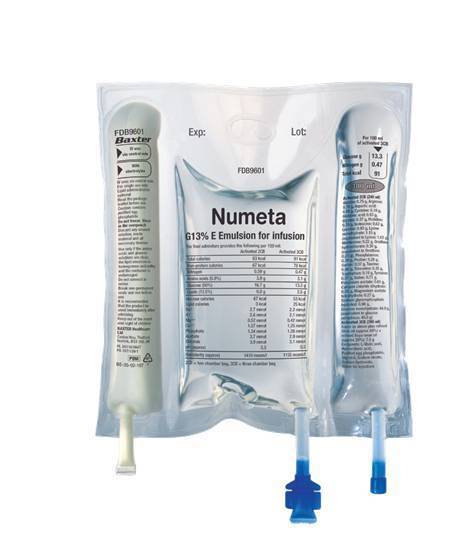In 2010, the primary provider of lipids used in American hospitals noticed that they weren’t very profitable… so they stopped producing them. I guess they’re allowed to do that. The main problem though was that the FDA took almost 4 years from that point to agree that US hospitals were allowed to import European lipids (fats) for feeding patients who could only eat via IV feeding solutions (otherwise called Total Parenteral Nutrition or TPN).
In the intervening years, hospitals simply fed patients pure dextrose, vitamins, and amino acids with no fats to buffer the insulin shocks these incomplete formulas caused. Most patients in this situation quickly lost skin elasticity, had their hair weaken / fall out, or in the most extreme cases, patients could begin suffering macular degeneration or accelerated diabetes symptoms.
Fortunately for hospital administrators, patients on TPN have such poor outcomes already that individual families probably couldn’t reliably connect their loved ones’ more rapid declines in health directly to the incomplete feeding formulas hospitals were supplying them. And even though it sounds absurd that there could be FDA-induced drug shortages for basic medical supplies in the US, unfortunately, this has only become more common over time.
In 2010 there were 178 drug shortages reported to the FDA of which 132 were sterile injectable drugs. The number of reported shortages increased to 251 in 2011, 183 of which involved sterile injectable drugs. As of February 28, 2013 there were 324 medications in short supply and of these 228 (70%) are sterile injectables. All PN products except dextrose and water have been in short supply at some point since spring of 2010.
Translation: US healthcare regulators aren’t even trying. Basic products like saline and lipids have gone into shortages due to the FDA setting up a system that can never self-correct with market forces. Instead, problems can only be fixed in a reactionary manner, months or years after disaster strikes via emergency FDA action to temporarily allow imports after shortages become intolerable. This gives the FDA several opportunities a year to announce that they have heroically ended drug shortages… while ignoring that their policies insured the shortages would be created in the first place.
And of course, no other first world country suffers these types of shortages because no other country prohibits importation of basic medical supplies. If this was happening anywhere else in the world, we’d be airlifting supplies and dropping them directly to the people as a humanitarian response. But because it’s America, we all just shrug and say something about how our healthcare system is “broken”.

9 Responses to “US Hospitals Escape 3 Year Lipid Shortage”
April 13
Scott FowlerThat is one of the most insane situations I think I have ever heard. You built the FDA to regulate the frontiers of new medicine – and they cause a shortage in fats and fucking salt water.
That is like hiring a garbage disposal crew who turn around and ship waste out of landfills onto your lawn. It’s like hiring a building crew to build your house and they demolish your neighbours house instead. Just … how is this possible?
April 13
Jonathan GillWelcome to the Freak Show of Life.
April 13
Ashley MeyerWhat can & should we do here besides shrug and say something about how our healthcare system is broken?
April 13
Artem LamninWelcome to Northern Honduras. Government-induced shortages of basic goods are a well known feature of life in socialist countries (think Soviet breadlines and the current Venezuelan protests). Things are only going downhill in the next twenty years, so just be happy that the FDA isnt taking actual bribes to approve or disapprove specific drugs yet.
April 14
nyphilLouie,
Your outrage is well-founded, but your understanding of the causes is not. If you want to understand the real root cause of the drug shortage crisis, read our op-eds on this issue: New York Times of 9/3/13, “How a Cabal Keeps Generics Scarce”: http://www.nytimes.com/2013/09/03/opinion/how-a-cabal-keeps-generics-scarce.html
Baltimore Sun of 2/7/14, “GPOs fuel drug shortages”: http://articles.baltimoresun.com/2014-02-07/news/bs-ed-drug-shortage-20140209_1_shortages-supply-chain-drugs.
Buffalo News of 3/16/14, “Schumer defends system that creates shortages of critical prescription drugs”: http://www.buffalonews.com/opinion/another-voice/another-voice-schumer-defends-system-that-creates-shortages-of-critical-prescription-drugs-20140316
Then call Sen. Chuck Schumer at (202) 224-6542 and tell him to stop protecting the kickbacks of his campaign donors in the GPO industry, notably Premier Inc. and the Greater New York Hospital Association, and repeal the 1987 Medicare anti-kickback safe harbor IMMEDIATELY!
Phil Zweig MBA
Executive Director
PhysiciansAgainstDrugShortages
April 14
Louie HelmYour op-ed’s reasoning doesn’t really make sense. And the more in-depth Medscape story about the issue doesn’t really bare out your theory either: http://www.medscape.com/viewarticle/778146
Just because there are bulk buyers with strong purchasing power shouldn’t create shortages. Your claim that GPOs have made saline and other “drugs” have razor thin profits is asinine. The market would have done that without GPOs… the companies are making a commodity.
I expect that the 1987 law you’re campaigning against should be repealed and I’m glad you at least care about this issue. But it looks like your theory doesn’t account for what’s happening with shortages. Good luck!
Cheers,
Louie
April 14
nyphilThere’s no point wasting my time debating with someone like yourself who thinks he knows it all, but in fact knows nothing about how the hospital supply chain system really works (or in this case, doesn’t). Your blog post was pure uninformed conjecture. Stick to proving math formulas or whatever it is you do. FYI, HCMatters is the house organ of the hospital group purchasing industry trade association, HSCA.
I will not reply to any more of your messages.
April 14
Louie Helmlol
April 14
Louie HelmWhat are your thoughts on responses to your theories like this?
“Blame Gamers Now Targeting GPOs for Injectible Drug Shortages”
http://hcmatters.com/2013/08/blame-game-targeting-gpos-for-injectible-drug-shortages/
That seems to be closer to my reaction to your theory than taking it at face value.